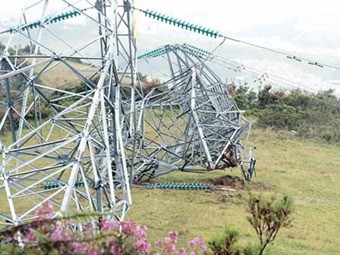Filed under: Editorials, Incarceration, Mexico

From Contra Info
Translated by It’s Going Down
As we have well known, Telmex is a company that not only promotes bullfights, damages and destroys the planet with its telephone antennas, promotes massive lazy stupidity with its internet cables, and gives people cancer with its telephones and telephone antennas; Telmex also builds private prisons and prisons with private-federal investors in Mexico. Carlos Slim, the owner of this Mexican monster is also owner and co-owner of other companies that participate in megaprojects of urbanization, gentrification and environmental destruction, companies such as ICA, for example.
In this country, some federal prisons called CEFERESOs (Federal Centers for Social Readaptation) have been built with so-called “private initiative” money now that locking people up seems to be a profitable business for businesspeople and corporations. In total, ten more federal prisons are planned, adding up to 29 along with the existing ones. The “staff” working in the new CEFERESOs, which are in fact a new federal penitentiary system, are being trained by U.S. military and police personnel with funds from the Mérida Initiative. The conditions inside these “new” prisons are without a doubt barbaric for the prisoners, which doesn’t meant that they aren’t also in prisons for lower-profile prisoners. However, in federal prisons the prisoners are exposed to various psychological tortures – such as solitary confinement – with the goal of degrading them but using the argument that as dangerous prisoners they must be controlled. Enter into this game of power groups such as the American Correctional Association (ACA), who are charged with certifying that “all is well” and that prisoners receive the proper treatment – according to their status as prisoners.
Through their actions, groups like ACA justify and perpetuate prisons. In federal prisons, prisoners only have the right to visit with direct relatives, they rarely even see their lawyers – due to the restrictions imposed on prisoners, but also because many prisoners are not from the area where they are being held but instead are sent to prisons farther away. In addition, prisoners have a kind of bank account administered by the prison system itself, where relatives can deposit a certain amount of money. In some prisons it is the same partner companies or the state who administer the money, while in others it is banks like BBVA who participate in the business. These prisons have cutting-edge technology provided by the partner company…which is the same one that the federal and Mexico City governments get security cameras from. To ensure the proper functioning of these federal and state prisons, the National Academy of Prison Administration was opened in Xalapa, Veracruz in May 2009, where 252 prison guards and employees have been trained in how to repress. All told, federal prisons are definitely a lucrative business for businesspeople and companies, but are also a pillar of support maintaining the state, authority and power.
 We as anarchists are against prisons, against any kind of prison, including the so-called people’s jails so popular among Leninists or in some areas controlled by guerrillas. And we are against all prisons, be they federal, state, juvenile, annexes, be they new or old. This is because we are not only against some powerful oligarchs at the summit of power, nor are we only against political parties and businesspeople, we are against power in its totality (macro and micro) and against all that imposes enclosure on a person, animal or nature. Why is it that with every change of administration – of one political party for another, of dictatorship – democratic or military, of regime – fascist, Cuban, Bolivarian, or people’s power – prisons do not disappear? The answer is simple: because they are a pillar for the functioning of an authoritarian, repressive and oppressive state and society; because prisons contribute to establishing the order required to be able “to govern,” as inside of them are the dissidents of the current society, and inside will be the dissidents of tomorrow. So we think that the struggle against prisons and the attack against that which sustains them should not be separate from a critique encompassing all that exists, as the prison system and prison as an instrument of power are pillars that sustain the state and power and that complement the other pillars that make domination possible.
We as anarchists are against prisons, against any kind of prison, including the so-called people’s jails so popular among Leninists or in some areas controlled by guerrillas. And we are against all prisons, be they federal, state, juvenile, annexes, be they new or old. This is because we are not only against some powerful oligarchs at the summit of power, nor are we only against political parties and businesspeople, we are against power in its totality (macro and micro) and against all that imposes enclosure on a person, animal or nature. Why is it that with every change of administration – of one political party for another, of dictatorship – democratic or military, of regime – fascist, Cuban, Bolivarian, or people’s power – prisons do not disappear? The answer is simple: because they are a pillar for the functioning of an authoritarian, repressive and oppressive state and society; because prisons contribute to establishing the order required to be able “to govern,” as inside of them are the dissidents of the current society, and inside will be the dissidents of tomorrow. So we think that the struggle against prisons and the attack against that which sustains them should not be separate from a critique encompassing all that exists, as the prison system and prison as an instrument of power are pillars that sustain the state and power and that complement the other pillars that make domination possible.
Prisons sustain power and we are against it. And it is in this game of power that Telmex has acquired a large role. In fact, it always has.
Standing idly by accomplishes nothing; to attack the state and its business allies, to subvert the relationships and roles of power that prevail in society – that even exist in ourselves – is what we conceive of as a coherent struggle and we act as a result of it. If you want freedom you need to tear down power, not wait for someone to give it to you or sell it to you at a price you believe your dignity is worth. In this scenario of attack, Telmex has always been a target of anarchists and other groups fighting for animal or earth liberation, and we see no reason why today, when Telmex is acquiring another major role as a prison-building company that supports the idea of prison, it should stop being one. Evidence of the attacks against this company is the fact that, from 2001 to 2012, 696 attacks were carried out – of those that were recorded – against Telmex properties around the country (attacks that consisted of the destruction or disabling of telephone booths, destruction of telephone and internet control boxes, burning of company trucks, burning telephone towers, a bomb threat at Carlos Slim’s Plaza Delta Mall, an arson attack at a Telmex collections office), actions carried out from various perspectives and motives, but always with the intent to sabotage the communications monster. The most recent actions reported were the burning of a company truck in January 2016 and the disabling of 13 telephones in Ciudad Nez, State of Mexico, on June 17, 2016.
Sabotaging this company isn’t as difficult as people think. According to what we’ve seen, the majority have been sabotages easily reproduced by anyone, such as disabling payphones. Some have been burned, others destroyed with a firework set off with a cigarette embedded on the wick as a timer, and many more sealed with rubber cement and paperclips. In the best cases, disabling telephone and internet control boxes have been done with rudimentary incendiary devices or with acid sprinkled on the cables inside the box, or simply cutting the small cable lines. Against telephone poles (not cell towers) some have opted to knock them down or have simply cut the wiring. Against trucks belonging to this ecocidal company, rudimentary incendiary devices have done their jobs well. But above all it is the creativity that materializes from our desires for the spread of sabotage and its replicability. There is no difference between big or small sabotage, they are all indispensable in the process of insurrection.
 We are not for “striking a blow at the heart of the state,” as along with this claim being part of the logic of the taking of power, it otherwise would delimit the insurrectionary goal into a centralized attack when part of the goal is that sabotage spreads and is not a single attack every now and then carried out by a group of professionals, but rather many daily attacks against a world that stifles freedom, carried out by those who want to, as every attack is liberating. Nor are we for “hitting where it hurts,” as along with this claim smacking of the quantitative, it delimits the insurrectional goal into attacks against a single structure within the pillar of domination, when part of the goal is the generalization of revolt, that the attacks be against all aspects of domination or that the goal be to attack, from the largest to the smallest, at an individual or affinity group level. Besides, hitting where it hurts, does the occasional – due to the need for specialization – attack really hurt? Why settle for what hurts the system? Why not destroy it? For us, revolt and insurrection are daily acts that take place within ourselves and are externalized from us as strikes against power.
We are not for “striking a blow at the heart of the state,” as along with this claim being part of the logic of the taking of power, it otherwise would delimit the insurrectionary goal into a centralized attack when part of the goal is that sabotage spreads and is not a single attack every now and then carried out by a group of professionals, but rather many daily attacks against a world that stifles freedom, carried out by those who want to, as every attack is liberating. Nor are we for “hitting where it hurts,” as along with this claim smacking of the quantitative, it delimits the insurrectional goal into attacks against a single structure within the pillar of domination, when part of the goal is the generalization of revolt, that the attacks be against all aspects of domination or that the goal be to attack, from the largest to the smallest, at an individual or affinity group level. Besides, hitting where it hurts, does the occasional – due to the need for specialization – attack really hurt? Why settle for what hurts the system? Why not destroy it? For us, revolt and insurrection are daily acts that take place within ourselves and are externalized from us as strikes against power.
We are in favor of an anarchy that understands attack as multiform and daily, carried out by those who desire to be free in the here and now, far from all specialization and professionalization (of the pen and the act). We understand anarchy as a tension with what exists, as a project for the destruction of power, and we are fighting to build a reality of struggle and true confrontation with domination. Telmex is just one of the pillars that sustain power, the state and capitalism. Telmex has many branches ready to receive an attack from those freedom-seeking individuals.
Some anarchist compas, Mexico, June 19-25, 2016





